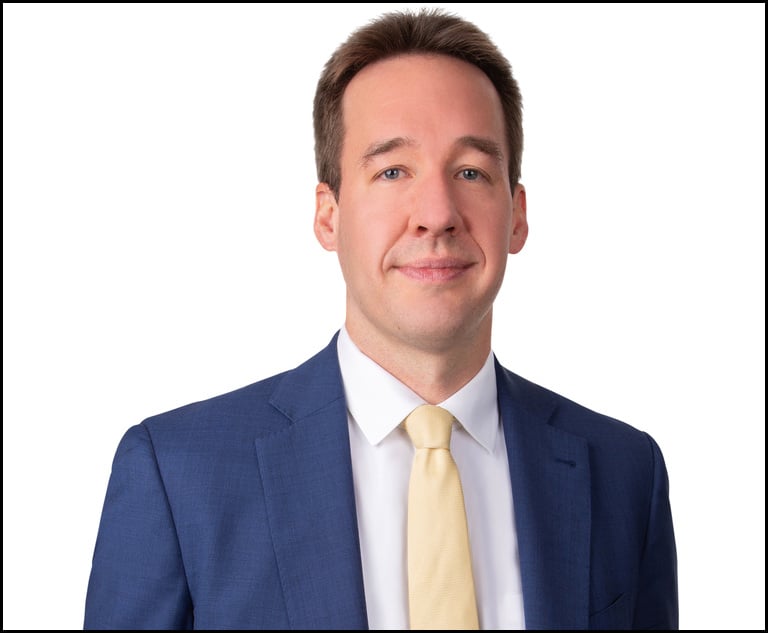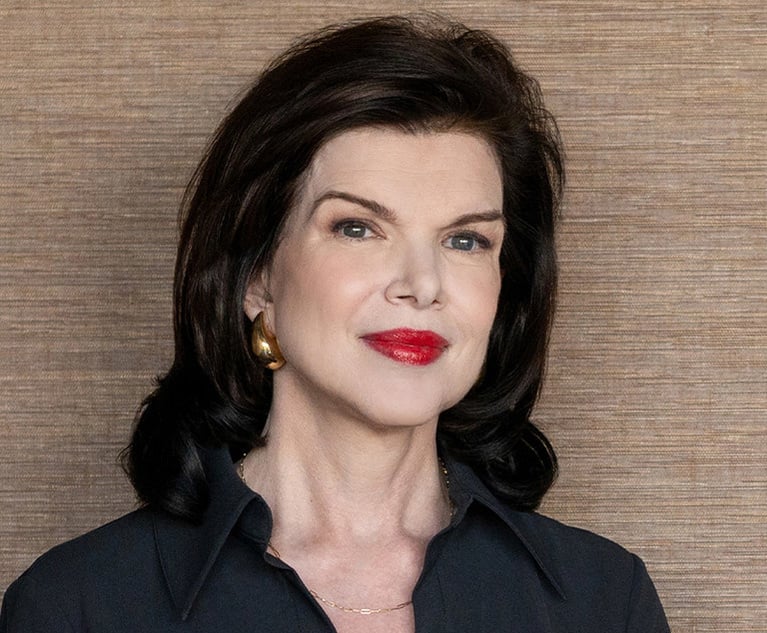In the Legal Profession's Mental Health Movement, Law Firm Staffers Feel Left Behind
Recent suicides have highlighted the degree to which law firm professional staff face many of the same pressures as their lawyer colleagues, yet many feel they are being neglected.
August 12, 2019 at 05:34 PM
5 minute read
The original version of this story was published on Law.com
 Photo: solarseven/Shutterstock.com
Photo: solarseven/Shutterstock.com
Ian Turvill was chief marketing officer at Chicago-based Freeborn & Peters in 2017 when he died by suicide in his home in Evanston, Illinois.
The circumstances of his death echoed that of law firm partners who recently ended their own lives. He was under immense pressure to meet deadlines. He worried that any failure would mean losing his job. He had long struggled with depression and anxiety, yet he hid it at work, and his death came as a surprise to everyone except his wife, Marny Turvill.
"He was terrified what would happen if anybody knew he was sick or struggling in any way," said Dr. Marny Turvill, Ian's wife and founder of Outside the Pill Box, a holistic medical practice. "If you show vulnerability it's the kiss of death. You'll be overlooked for projects or promotions. If people have any doubt that you would perform at the highest level you won't be trusted."
Two weeks ago—less than two years after Ian Turvill took his life—Doug Johnson, a legal consultant in Denver who previously was chief strategy officer at Drinker Biddle & Reath and who did work for Holland & Hart, also died by suicide. While separated by geography and time, both these deaths demonstrate that law firm professional staff can also succumb to the same pressures and stress that afflict their attorney colleagues.
But even as mental health takes a front seat in law firms, bar associations and conferences, many professional staff—whether in legal operations, pricing or marketing—see the effort largely focused on attorneys. There are few, if any, studies that examine the rates of depression, anxiety, addiction or suicide among law firm professional staff.
And despite the plethora of resources available at several large firms today, including on-site mental health professionals and wellness applications, many have not extended their mental health resources firmwide. A survey of 30 Am Law firms found that 36% of firms that say they offer mental health programming do not extend those programs to their professional staff.
This bifurcated mental health treatment is actually symptomatic of one of the most acute stress factors afflicting law firm professionals: a power hierarchy that devalues professional staff.
Many describe law firms as extremely hierarchical, dominated by rainmaking partners who often lack any formal leadership or management training. Those who don't hold law degrees but nonetheless contribute to the success of the firm are often dubbed a "nonlawyer," a moniker that comes with second-class status and exacerbates the stress many professionals already face.
Mark Greene, president of consulting firm Market Intelligence and interim CMO of Munger, Tolles & Olson, said that while most corporations and industries give professional staff a seat at the leadership table, law firms rarely do.
"The fact that almost no law firms do is indicative of the degree to which we're somewhat marginalized and that puts pressure and [shows a] lack of respect and appreciation of us as professionals," he said.
Deborah Farone, founder of Farone Advisors and former CMO at Cravath, Swaine & Moore and Debevoise & Plimpton, said that although law firm professionals believe in their firm and the work they do, the feeling of otherness can be isolating.
"If you feel that you're being told you're a nonlawyer or non-something, it's very disconcerting having that dissonance between what you're being called and what your responsibilities are," she said.
Structural problems within the profession manifest themselves in other ways, too. Many professional staff tell stories of being screamed at by a senior partner who never faces repercussions, of juggling several disparate tasks from a wide range of attorneys and even other departments.
"I think the No. 1 reason my staff when I was CMO experienced stress is because they felt like they had to serve every partner, every lawyer, every other department as their client. And everything was urgent; everything was important," said Mark Beese, founder of the legal consulting firm Leadership for Lawyers.
"You never went home with the feeling that you've done your job—that you've satisfied all of your clients," he continued. "You always went home leaving something on the table or not doing something to the level of perfection that's expected."
Since many of the exacerbating factors stem from the organizational structure and culture of law firms, many say the solutions lie in addressing the structure itself.
Greene said that firms should treat their C-suite executives as contributors to the business of the firm and empower them to watch and protect their own staff. Beese added that firms should reexamine their mission statement and culture. Several professionals agreed that professional staff should join a trade organization such as the Legal Marketing Association to combat isolation.
And because a heightened concern for attorney mental health has already brought in a slew of new programs and resources, many say that simply extending those mental health resources to all law firm staff could go a long way.
"There has to be parity in what's offered," Farone said. "We should ensure that whatever we're extending to the lawyers we're extending to the professional staff."
Similar Stories:
Minds Over Matters: An Examination of Mental Health in the Legal Profession
'Big Law Killed My Husband': An Open Letter From a Sidley Partner's Widow
Cottage Industry Develops Around Lawyer Well-Being
When it Comes to Mental Health and Substance Abuse Support in Legal, What About the Staff?
This content has been archived. It is available through our partners, LexisNexis® and Bloomberg Law.
To view this content, please continue to their sites.
Not a Lexis Subscriber?
Subscribe Now
Not a Bloomberg Law Subscriber?
Subscribe Now
NOT FOR REPRINT
© 2025 ALM Global, LLC, All Rights Reserved. Request academic re-use from www.copyright.com. All other uses, submit a request to [email protected]. For more information visit Asset & Logo Licensing.
You Might Like
View All
Alston & Bird Adds M&A, Private Equity Team From McDermott in New York
4 minute read
Veteran Federal Trade Law Enforcer Joins King & Spalding in Washington
4 minute read
Houston Trial Lawyer Mary-Olga Lovett Leaves King & Spalding to Open Boutique
3 minute readTrending Stories
- 1Court Rejects San Francisco's Challenge to Robotaxi Licenses
- 2'Be Prepared and Practice': Paul Hastings' Michelle Reed Breaks Down Firm's First SEC Cybersecurity Incident Disclosure Report
- 3Lina Khan Gives Up the Gavel After Contentious 4 Years as FTC Chair
- 4Allstate Is Using Cell Phone Data to Raise Prices, Attorney General Claims
- 5Epiq Announces AI Discovery Assistant, Initially Developed by Laer AI, With Help From Sullivan & Cromwell
Who Got The Work
J. Brugh Lower of Gibbons has entered an appearance for industrial equipment supplier Devco Corporation in a pending trademark infringement lawsuit. The suit, accusing the defendant of selling knock-off Graco products, was filed Dec. 18 in New Jersey District Court by Rivkin Radler on behalf of Graco Inc. and Graco Minnesota. The case, assigned to U.S. District Judge Zahid N. Quraishi, is 3:24-cv-11294, Graco Inc. et al v. Devco Corporation.
Who Got The Work
Rebecca Maller-Stein and Kent A. Yalowitz of Arnold & Porter Kaye Scholer have entered their appearances for Hanaco Venture Capital and its executives, Lior Prosor and David Frankel, in a pending securities lawsuit. The action, filed on Dec. 24 in New York Southern District Court by Zell, Aron & Co. on behalf of Goldeneye Advisors, accuses the defendants of negligently and fraudulently managing the plaintiff's $1 million investment. The case, assigned to U.S. District Judge Vernon S. Broderick, is 1:24-cv-09918, Goldeneye Advisors, LLC v. Hanaco Venture Capital, Ltd. et al.
Who Got The Work
Attorneys from A&O Shearman has stepped in as defense counsel for Toronto-Dominion Bank and other defendants in a pending securities class action. The suit, filed Dec. 11 in New York Southern District Court by Bleichmar Fonti & Auld, accuses the defendants of concealing the bank's 'pervasive' deficiencies in regards to its compliance with the Bank Secrecy Act and the quality of its anti-money laundering controls. The case, assigned to U.S. District Judge Arun Subramanian, is 1:24-cv-09445, Gonzalez v. The Toronto-Dominion Bank et al.
Who Got The Work
Crown Castle International, a Pennsylvania company providing shared communications infrastructure, has turned to Luke D. Wolf of Gordon Rees Scully Mansukhani to fend off a pending breach-of-contract lawsuit. The court action, filed Nov. 25 in Michigan Eastern District Court by Hooper Hathaway PC on behalf of The Town Residences LLC, accuses Crown Castle of failing to transfer approximately $30,000 in utility payments from T-Mobile in breach of a roof-top lease and assignment agreement. The case, assigned to U.S. District Judge Susan K. Declercq, is 2:24-cv-13131, The Town Residences LLC v. T-Mobile US, Inc. et al.
Who Got The Work
Wilfred P. Coronato and Daniel M. Schwartz of McCarter & English have stepped in as defense counsel to Electrolux Home Products Inc. in a pending product liability lawsuit. The court action, filed Nov. 26 in New York Eastern District Court by Poulos Lopiccolo PC and Nagel Rice LLP on behalf of David Stern, alleges that the defendant's refrigerators’ drawers and shelving repeatedly break and fall apart within months after purchase. The case, assigned to U.S. District Judge Joan M. Azrack, is 2:24-cv-08204, Stern v. Electrolux Home Products, Inc.
Featured Firms
Law Offices of Gary Martin Hays & Associates, P.C.
(470) 294-1674
Law Offices of Mark E. Salomone
(857) 444-6468
Smith & Hassler
(713) 739-1250











